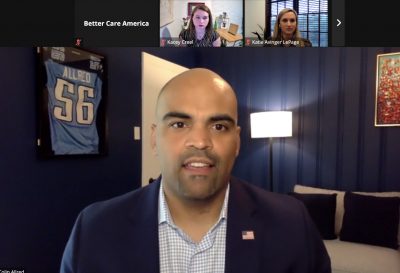Rep. Allred opened the conversation by sharing that health equity is the biggest challenge his district faces and one of his top priorities in Congress. He noted that the COVID-19 pandemic has shone a greater light on the disparities in outcomes that are apparent in our health care system, and applauded the work of the American Rescue Plan to expand health access amidst this crisis. He said that Congress and Texas need to continue to look for innovative solutions to improve health equity, such as an expansion of the Affordable Care Act and avenues for municipalities to expand Medicaid on their own when states like Texas decline to do so. Before opening the floor to participants, Rep. Allred celebrated the success of telehealth during the pandemic, and its continued importance in closing the health equity gap. As a member of the House Committee on Veterans’ Affairs, Rep. Allred noted that the U.S. Department of Veterans Affairs has seen great success from relying on telemedicine more heavily throughout the pandemic.
“It’s important for us to find ways to address those who live in hard-to-reach places, and that may be part of vulnerable populations,” Rep. Allred stated.
Alyssa Canter, Director of Government Affairs at Oscar Health, offered an overview of Oscar Health and the plan’s goal of being a socially conscious insurer. Canter also praised the American Rescue Plan for its broadened premium credits that have helped more Texans afford coverage during this critical time. Canter detailed the steps Oscar is taking to use technology to combat health inequities: “We harness technology and use analytics to ensure members are receiving care that fits their cultural needs and preferences.”
Tamara Ward, Oscar’s Central Region Market Leader, spoke in-depth about the health plan’s recently launched Culturally Competent Care Program, which focuses on deepening the relationship between patient and provider through education, community networks. “Over the last year, we’ve worked very hard to collect better provider data, invest in our community through purposed corporate giving, and partner with national health care agencies to work to achieve multicultural health care distinctions,” said Ward. “We now deploy member experience initiatives that really improve member satisfaction and overall health care outcomes.” Ward went on to note that Oscar hopes to share the Culturally Competent Care model with other industry leaders and with elected officials so that more individuals can be met with improved health care outcomes.
Oscar is currently partnering with local organizations with ties to marginalized communities. For example, one of Oscar’s Texas-area Culturally Competent Care Program partners is Diversity in Diabetes (DiD). DiD Chief Operating Officer Kacey Creel shared that the organization was founded out of her experience at diabetes conferences where she, as a Type 1 diabetes patient, noticed an underrepresentation of people of color. “We wanted to figure out how we can bring the amazing diabetes education that you get through these conferences to people who really need it the most,” she said. DiD operates under four focus areas: increasing access to diabetes education and support; increasing awareness and knowledge of treatment options; increasing utilization of technology for people of color living with diabetes; and increasing representation of providers and educators in the diabetes space. With Oscar’s Culturally Competent Care grant, DiD was able to host a Virtual Diabetes Education Program – six weeks of classes via Zoom – for Black and Hispanic Texans 65+ who have type II diabetes. Creel is hopeful that her program and others like it will continue to reach previously underserved populations and help them achieve better health outcomes.
Other meeting participants included Dr. Steve Miff, President and CEO at the Parkland Center for Clinical Innovation (PCCI), and Dr. Leslie Wainwright, the Parkland Center’s Chief Funding and Innovation Officer. PCCI is a non-profit organization focused on addressing social determinants of health and health equity though data-driven approaches. Dr. Miff shared that health begins at home and in our communities, not in a doctor’s office, and PCCI works to understand the whole person and their environments. PCCI acquires data by talking directly to patients, reviewing notes from clinicians, and using algorithms to estimate what a patient may experience because of their specific environment. By identifying the root causes of health care inequity, PCCI can also work to find solutions. Dr. Wainwright shared PCCI’s efforts to link clinical and non-clinical solutions by connecting clinicians with community organizations to reach vulnerable populations. Rep. Allred was particularly interested in PCII’s work to address maternal health in Texas, asking Dr. Miff and Wainwright to share the information they have on the topic with his office.
Rep. Allred concluded the event by thanking the participants for their work in Texas and encouraging them to continue to fight for improved health equity and broadened health care access in the state.
